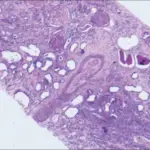Renal infarcts are kidney syndrome resulting from disruption of the typical blood supply to a portion of, or to the entire kidney.
What is the Pathology of Renal Infarcts?
The pathology of renal infarcts is:
-Etiology: The cause of renal infarctions is embolism, aortic dissection, renal artery dissection, malignant hypertension, and renal vein occlusion.
-Pathogenesis: The sequence of events that lead to renal infarcts is unclear, following the event of embolism.
-Genes involved: Unknown.
-Morphology: The morphology associated with renal infarcts show solitary, multiple pales, yellow-white infarcts lesions, small irregular foci of hemorrhagic discoloration.
-Histology: The histology associated with renal infarcts shows fibrous scarring.
How does Renal Infarcts Present?
Patients with renal infarcts are typically more common in females present at the age range of 45 to 65 years. The symptoms, features, and clinical findings associated with renal infarcts include asymptomatic, acute flank pain, tenderness to the costovertebral angle, and hypertension.
How are Renal Infarcts Diagnosed?
Renal infarcts are diagnosed by radiological studies such as CT angiogram visualizes occluded vessels. Ultrasound shows wedge-shaped regions of nonperfusion.
How are Renal Infarcts Treated?
Renal infarcts are treated by supportive management, and revascularization of the kidney.
What is the Prognosis of Renal Infarcts?
The prognosis of renal infarcts is fair with prompt diagnosis and management.



